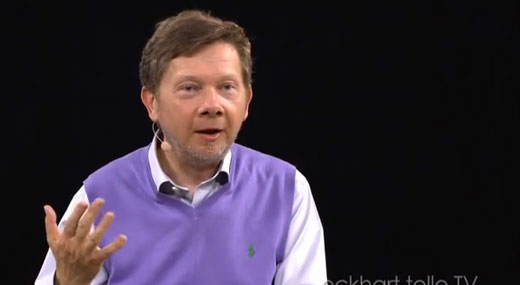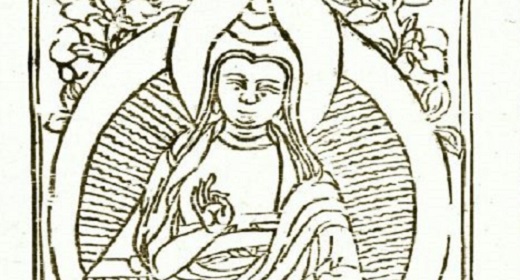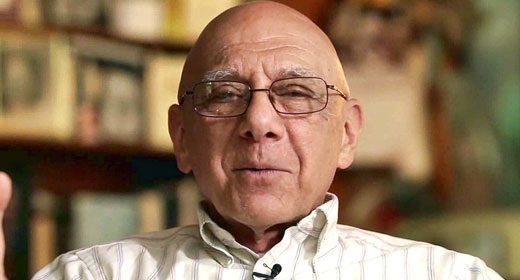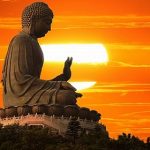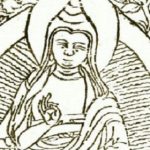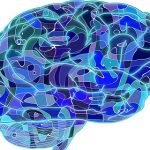by Pir Vilayat Khan: How can we deal with the outrage and suffering? Is there anything that we can do? What can we do?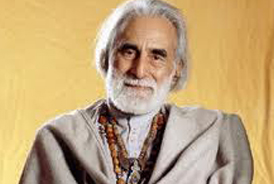
In the present crisis, in our dismay at a disturbed, faltering world teetering at the edge of disaster (or is it being afflicted by exceedingly pernicious and hazardous birth pangs announcing a brave new world?) as we quiver at the threat of wreaking further unimaginable escalating havoc upon our erstwhile beautiful planet and killing or causing excruciating pain upon millions, perhaps billions, of innocent people, our spiritual values are at stake.
Perhaps the best way to understand and to participate in the total happening, each in our own little way, is to look at it at the personal scale. One can say this challenge invites us to look within ourselves and discover hidden emotions. It is not always easy to reconnoiter them. They hide. It requires an act of truth, of sincerity, to really have enough faith in truth to be able to face them.
We are all emotionally shocked and outraged by the incredible cruelty, the horror, of what has happened. In fact we are a wounded human family. We can never continue thinking and feeling as we did before. The recent events demonstrate the degree to which resentment and hatred can lead towards monstrous acts, especially if they are sustained by a faulty understanding of one’s religion. There is misunderstanding, mis-assessment, miscommunication.
War, violence, cruelty, with all its trail of misery, starts in each one of us, with our storms in our teacups, our little human problems. And altogether it escalates into terrible problems, even mass murder. The mass destruction will resonate through history as a portent of the vulnerability of the constructs of our affluent sophisticated civilizations in the hands of a few brain-washed lost souls, acting on a faulty interpretation of their religion, who have never heard of the pursuit of “the awakening of humanity to the divinity of the human status; the awakening of conscience.”
We are tested as to whether to retaliate for the atrocious cruelty to people going about their daily work. This would be slipping into primitive feuds, vendettas, a time when it was customary that an insult could only be atoned for by revenge to indemnify one’s honor.
Hazrat Inayat Khan:
| A person has a natural tendency that if he is insulted, he thinks that the proper way of answering is to insult the other person still more. Yet he gets a momentary satisfaction to have given a good answer. |
Umpteen numbers of lives have been forsaken in past wars motivated by retribution when they could have been spared by a more civilized sense of honor. Moreover it rebounds upon the avenger.
Hazrat Inayat Khan:
Thus, spurred by our wounded emotion, we tend to react out of anger with bravado rather than act in a concentrated way to control the situation.
Let us recall an incident in the life of Hazrat Ali who released an enemy who spat at his face. Whereupon the enemy asked him why he did not kill him. Hazrat Ali said: “I did not wish to react in anger.”
Christ’s teaching “resist not evil” is a hint not to participate in and be guilty of the same evil.
The tidal wave of resentment that has surfaced in our troubled days jeopardizing the fruit of the toil of dedicated human endeavor and skill, disrupting our society; the damage to our lovely Planet by disregard for its sacredness and the despoiling of cherished values that bespeaks of decadence; these shake us out of our smug complacency and challenge us into exploring the core issues at the social scale and in ourselves.
We need to listen to the grievances behind the turmoil of outrage on all sides that spur our quarreling, hating each other, killing each other, wreaking excruciating suffering upon our fellow beings.
If one entertains values such as love, harmony, beauty, respect for the dignity of one’s fellow beings, and kindness, then discovering the degree to which the emotions of hate and the insensitive disregard of suffering erupt mercilessly, unscrupulously, when threatened or frightened – even amongst people who normally would function according to normal standards of appropriate behavior – is so distressing! Never has the Message of the awakening of conscience been so urgently relevant!
If we try to reconnoiter what are the emotional motives behind the present crisis, more than ever, it is clear that the hatred that triggered off this mutual violence at a massive scale is of the same nature as our resentment in our personal “storms in our cups of tea” and hence the importance of Christ’s message, “forgive those who offend us…they do not know what they do,” beckons upon us more relevantly than ever. And it is this message that resonates implicitly in Hazrat Inayat Khan’s message of respect for all religions and all races that has meant so much to so many people in our day and age.
Hazrat Inayat Khan:
Hazrat Inayat Khan
| The Sufi Message gives to the world the religion of the day….The message of God from time to time comes as tides in the sea, but what remains always is the sea, the truth…. |
The challenge draws our attention more than ever to whatever we can do (albeit how limited the outreach of each one of us is) to value and share with our friends, distraught as we are, the importance of “the awakening of conscience.” Here lies the crux of what sparked the crisis: it urges us to deal with that very originating emotion. We cannot extricate ourselves from the plight of our fellow beings in a time of strife.
Hazrat Inayat Khan:
| …the whole of humanity is one single body, and all nations, communities, and races are the different organs. The happiness and well-being of each of them is the happiness and well-being of the whole body. If there is one organ of the body in pain the whole body has to sustain a share of its strain.
Suffering is our first call.
|
Each little contribution on our part (however small) has its part to play in the overall tidal wave of sensitivity to the sufferings of people and, to be consistent: focus on the cause that sparks violence. It starts at the personal scale.
The feedback that reaches us is that, rather than simply meting out retribution for the sheer monstrous atrocity of Sept 11th, we need to reconnoiter the originating Machiavellian emotion that spurred the terrorists and explore honestly what motivates the retaliation. This beckons upon us to scan our own psyche to spot whether we nurture similar albeit less pernicious emotions ourselves at a personal scale. We cannot preach kindness as an antidote to cruelty if we ourselves are entertaining resentment, particularly if we are acting on the emotion of this resentment to harm (or wish harm to) another living being. It starts with us.
Resentment is an inherited, primitive survival instinct written into our psychological defense system, which gets transmuted in the course of evolution into unconditional love.
In this conundrum, we have an impelling need to communicate with each other our quandaries, open our hearts, admit our uncertainty as to which is the appropriate action to deal with the ignominious challenge to the world in which we have been accustomed to live, admit that we ourselves are not immune from perhaps unavowed emotions of hate, intolerance, discrimination, or a partisan spirit understandably inspired by loyalty. In this we are tested in exactly the challenge that determines the decisions not only of those responsible for the conduct of situations that affect our lives, our security, our welfare, but of those operating behind the scenes disrupting the world order to give vent to their grievances.
It is said that on the hilt of Prophet Mohammed’s sword were the words: Forgive him who wrongs you; join him who cuts you off; do good to him who does evil to you, and speak the truth although it may be against yourself. (Cf. Helminski)
| Suffering is our first call. |
The whole of Buddhism started with Buddha’s search for an end to suffering.
Rather than retaliation at the social scale are we motivated by a global concern to protect the victims of violence? In which way can one ensure that security, without one’s intervention having the opposite affect by triggering off a backlash? There is a concern about the degradation of cherished moral values, safeguarded by tradition, and about a plethora of concupiscence while one’s kin on the planet are struggling in penury.
Religion is intended as the custodian of the sacredness of our paramount values.
In the present miscommunication at the core of the crisis, the teaching of the authentic Sufi masters has light to throw on the cultural paradigm dichotomy, around which the cultural dissentions gravitate, which spark the global conflagration.
| We will show them our Signs in the furthest regions of the earth and in their own souls. (Qur’an 41: 53, tr. Yusuf Ali) |
Ibn ‘Arabi:
| The signs alert us to what they manifest, what they reveal. He is known through the things. (Chittick, 1989, p. 225). One may see the Real behind the veil of things. (cf. Chittick, 1989, p 228). Things are like curtains over the Real. When they are raised, unveiling takes place. (ibid., p. 225) |
The consequence has been the quest for awakening ‘in life’ rather than ‘beyond existence’ (samadhi). It is validating both the knowledge gained by experience in the existential world and a kind of proto-critic knowledge inherent in our intelligence.
Hazrat Inayat Khan:
| The soul manifests in the world in order that it may experience the different phases of manifestation, and yet not lose its way by regaining its original freedom, in addition to the experience and knowledge it has gained in the world. Wisdom is born out of the meeting of the knowledge of the heavens and the knowledge of the earth. When the light from within is thrown upon this knowledge, then the knowledge from outer life and the light coming from within make a perfect wisdom. The guidance from the outer knowledge and the guidance from the inner intelligence are both necessary. If the inner light were enough, then man would never have been created; he would have been an angel. |
A Hadith (saying) of the Prophet says:
| Man ‘arafa nafsahu faqad ‘arafa rabbahu – Whosoever knows himself knows his Lord. |
Hence the importance of one’s very self-validation; but it must include the peri-personal dimensions of one’s being in one’s identity.
Hazrat Inayat Khan:
| The purpose of every soul is that for which the whole manifestation has been striving, and it is the fulfillment of that purpose that is called God realization. In order to attain God consciousness, the first thing is to make God a reality, so that He is no longer an imagination. If there is any sign of God, it is in the God-conscious. God realized beings bring to earth the living God. |
This interpolates the notion of God, not just as a principle, or even as the archetype, but as a personality manifesting and actuating Itself as us.
Hazrat Inayat Khan:
| The mystic does not think of God as abstract, although he knows God to be so. It is not a question of knowing, but of being. God for the mystic is the stepping stone to self-realization.
People ask: “If all is God, then God is not a person.” The answer: though the seed does not show the flower in it, yet the seed culminates in the flower, and therefore the flower already existed in the seed. No doubt it would be a great mistake to call God a personality, but it is a still greater mistake when man denies the personality of God. It is not wrong to make God in one’s imagination the God of all beauty, for by that imagination he is drawn nearer and nearer every moment of his life to that Divine Ideal which is the seeking of his soul.…Man in the flowering of his personality expresses the personality of God. |
It is this “change of identification” that fosters creativity. It challenges one to extricate oneself from one’s limited identity embodied in one’s inadequate self-image.
Hazrat Inayat Khan:
| There is a time in life when a passion is awakened in the soul which gives the soul a longing for the unattainable.
In man is awakened that spirit by which the whole universe was created. In the making of personality, it is God who completes His divine art. As the whole of nature is made by God, so the nature of each individual is made by himself. |
Hazrat Inayat Khan’s insight into the dilemma in our minds in trying to discern the difference between God’s will and man’s will bypasses our linear thinking in bold statements in new ways of thinking that presage the spirituality of the future. When one witnesses how many things go wrong, one questions that it is God’s action or that God intervened to save a catastrophe. While highlighting the divine action upon man, he upholds the impact of our thinking upon the whole.
Hazrat Inayat Khan:
| The divine mind becomes completed after manifestation. The Creator’s mind is made of His own creation. The experience of every soul becomes the experience of the divine mind.
There is a spirit that collects and accumulates all the knowledge that every living being has had. It all accumulates and collects in that mind as an eternal reservoir: the divine mind. Man has a will of his own that is not apart from the will of God. |
|
Practice
|
|
| Our mediations need to reflect the new perspectives, the deep conviction that no one can take away from you. Belief has led us to thinking of God as other, not recognizing La ilaha illa ‘llah. Thinking in terms of duality applies to our relationship to other people. We call them other but really they are other ourselves. That is deeply rooted in our dualistic thought about God. If we recognize that, then it will make it easier for us to recognize ourselves in another person and them in ourselves, discovering a sense of overwhelming unity that precludes all the fragmentation of the universe; a sense of wholeness. It is happening now. At the social level it is solidarity: we are all in this together. The consequence is a global world-view that is arising as opposed to the fragmentation in our thinking.
Hazrat Inayat Khan:
In order to arrive at the world-view, one is not to sacrifice the contribution of each of the parts, the fragments of the totality. How is one able to reconcile irreconciliables: an overview that doesn’t dismiss the differences? Think of a person who has really done you harm. Looking at it from your point of view you feel that you have been victimized and naturally you have a feeling of frustration. Try to get into the consciousness of that person. You can see they have an axe to grind. Maybe you are standing in the way of their needs. Their desperate need is self-validation. What is their need? Are you really standing in the way of their need, or are they misguided in their need? Can we see from the point of view of people who have really changed the course of our life? Can we enter into their way of thinking? There is even an argument in favor of their way of thinking. It’s a different vantage point. Somehow, develop a global world-view that incorporates but accepts these differences. There is a relative validity that contributes to the richness of the whole. We are learning to accept that there are different vantage points. Opinion is not ultimate. We are beginning to learn to agree to disagree. We would like people to agree with us; we have to accept that people think differently. The clue is fana, being unbiased, not looking at things from only one’s own point of view. |
|
Practice
|
| At a deeper level: What is the cause? Look at the cause, not with our mind, but from a deep place of love. When people feel condemned they will react.
Christ: Judge ye not. It is difficult not to judge. It is perhaps even more challenging than to love your neighbor. Don’t we have the right to have an opinion? How can one condone a cruel act without being judgmental? It’s very difficult. The only way is to place that adage in tandem with: They don’t know what they do. |
But, one may rightly ask, can we not protect ourselves if attacked?
If one’s compassion leads one to tolerate a person’s mistreatment, it encourages their unkind misbehavior and therefore is not good for that person. As already said, our ideals are: love and forgive your neighbor, rather than the ‘eye for an eye and a tooth for a tooth.’ This was Hazrat Pir o Murshid’s paramount principle. However there are cases where giving in to people hurting other people is failing to take responsibility. Hence Pir o Murshid’s caution:
| An eye for an eye and a tooth for a tooth is necessary when kindness and forgiveness will have no power whatever on the hard heart of the enemy. But so long as there is a chance of meeting the enemy’s revenge with kindness, then the above law may not be practiced. |
|
Practice
|
||
| Therefore one needs to combine authority with compassion. This requires great composure in the realm of emotion: making one’s opponent aware of one’s strength without affirming one’s ego. Here resides the great art of life – the hallmark of evolution from primitive instincts to what Hazrat Inayat Khan calls ‘the quest for perfection.’ It applies both at the personal level and the social scale.
This very provision avers its paramount antinomy in the Sephirotic tree of the Kabala. Khesed (compassion) – the way of the saint – and Din (rigor, the law) – the way of the master – are balanced in tandem. or “Dare you wage war against war?” exclaimed Bernard Shaw in Major Barbara. Cruelty countered by cruelty! Dare we wage peace on war? What if we dared attempting the unrealistic improbable! What if we emboldened ourselves to turn the tables on violence? What if we gave love a chance?
To turn one’s opponent into a friend, one needs to listen to his or her grievance, his or her suffering to ask: “Am I obstructing your vital, desperate needs? Have I been snubbing your dignity? How can I help?” Then give heartily and receive heartily in honorable exchange, in love, respect, and kindness. Just imagine the pain, suffering and senseless waste of human resources that this would free us from! Hazrat Inayat Khan:
|

